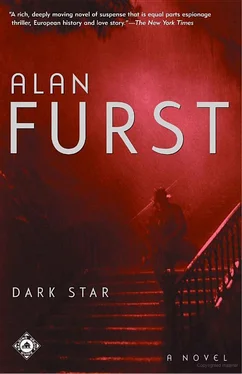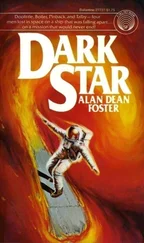Alan Furst - Dark Star
Здесь есть возможность читать онлайн «Alan Furst - Dark Star» весь текст электронной книги совершенно бесплатно (целиком полную версию без сокращений). В некоторых случаях можно слушать аудио, скачать через торрент в формате fb2 и присутствует краткое содержание. Жанр: Шпионский детектив, на английском языке. Описание произведения, (предисловие) а так же отзывы посетителей доступны на портале библиотеки ЛибКат.
- Название:Dark Star
- Автор:
- Жанр:
- Год:неизвестен
- ISBN:нет данных
- Рейтинг книги:3 / 5. Голосов: 1
-
Избранное:Добавить в избранное
- Отзывы:
-
Ваша оценка:
- 60
- 1
- 2
- 3
- 4
- 5
Dark Star: краткое содержание, описание и аннотация
Предлагаем к чтению аннотацию, описание, краткое содержание или предисловие (зависит от того, что написал сам автор книги «Dark Star»). Если вы не нашли необходимую информацию о книге — напишите в комментариях, мы постараемся отыскать её.
Dark Star — читать онлайн бесплатно полную книгу (весь текст) целиком
Ниже представлен текст книги, разбитый по страницам. Система сохранения места последней прочитанной страницы, позволяет с удобством читать онлайн бесплатно книгу «Dark Star», без необходимости каждый раз заново искать на чём Вы остановились. Поставьте закладку, и сможете в любой момент перейти на страницу, на которой закончили чтение.
Интервал:
Закладка:
Here the chronology was productive: it revealed a mirror image of this event.
Szara, while in Prague, had written a story for Pravda about the agony of the Czech people as Hitler closed in for the kill. That story was suppressed. It was not in Hitler’s interest for it to appear- evidently it was not in Stalin’s interest, either. Ultimately, Britain and France were blamed for the loss of Czechoslovakia at Munich but, in the very same instant, Stalin and the Red Army stood quietly aside and permitted it to happen.
Abramov had then protected Szara, his old friend and sometime operative, by absorbing him directly into the intelligence apparat - what better place to hide from the devil than in a remote corner of hell? In Paris, Szara had become Baumann’s case officer, in fact no more than one end of a secret communication system between Hitler and Stalin.
Then, a chance event that neither the Gestapo nor the NKVD could have foreseen.
The Paris OPAL network had broken through the screen of secrecy hiding their ongoing cooperation. Through Seneschal’s unwitting agent, the secretary Lotte Huber, Szara had discovered a meeting between Dershani, Khelidze’s superior in the Georgian khvost, and Uhlrich, a known SD officer, and photographed it. Seneschal had been murdered almost immediately because of this and Abramov had died for it a year or so later. Abramov, Szara now believed, had changed sides, attempted to use the photographs as leverage, and they had eliminated him as he attempted to escape.
There was more: Molotov’s replacing Litvinov as the Hitler/ Stalin courtship approached its moment of revelation, and Hitler’s public approval of the change. Even Alexander Blok’s poem “The Scythians” seemed to have played a part in the operation. Here, the analysis depended on audience. If, on the night of the actor Poziny’s recitation, the message was to the British and French diplomats in attendance, the poem served as a plea and a warning, which was how Blok had meant it: “We ourselves henceforth shall be no shield of yours we ourselves henceforth will enter no battle … Nor shall we stir when the ferocious Hun rifles the pockets of the dead / Burns down cities …” To a German ear, however, at that particular moment in history, it might have meant something very different, something not unlike an invitation, from Stalin to Hitler, to do those very things. To bend Blok’s poem to such a purpose was, to Szara, a particularly evil act, and it touched him with horror as nothing else had. He himself knew better, that compared to other evils the abuse of a poet’s words oughtn’t to have meant that much, yet somehow it did. Somehow it opened a door to what now happened in Europe, where, with Stalin’s concurrence, the words became reality. The horror took place.
Late at night in Izmir, the spring wind blowing hard off the Aegean Sea, Andre Szara stared sightlessly out the window above his writing table. He would never understand the mysteries that these two peoples, the Russian and the German, shared between them. Blok had tried as only a poet could, applying images, the inexplicable chemistry at the borders of language. Szara would not presume to go deeper. He could see where answers might be hidden-somewhere in what happened between him and Marta Haecht, somewhere in what happened between Nadia Tscherova and her German general, somewhere in what happened between Hitler and Stalin, somewhere in what happened, even, between himself and Von Polanyi. Trust and suspicion, love and hate, magnetism and repulsion. Was there a magic formula that drew all this together? He could not find it, not that night in Izmir he couldn’t. Perhaps he never would.
He could think only of Bloch’s final act in the drama, in which he had maneuvered Szara into the reach of de Montfried. It was as though Bloch, confronted by the certainty of failure-Beria ascendant, the murderers securely in power, a pact made with the devil- had sent one last message: save lives. Szara had done the best he could. And then the reality of circumstance had intervened.
And, soon enough, the reality of circumstance was that choices had to be made.
Szara filled a score of notebooks before he was done: messy, swollen things, pages front and back covered-entirely in disregard of the ruled lines-in penciled Russian scrawl, erasures, scribbled-out words from moments when the great impatience was on him. In time, he began to live for the night, for the hours when the people of his life would come alive and speak. His memory astonished him: what Abramov said, the way Marta would put things, Vainshtok’s sarcasms-and what may have been the final gesture of his life, which Szara never really did come to understand.
The potwasher’s job took its toll. The skin of his hands dried out, cracked, and sometimes bled-occasionally he left a blood-spore at the margin where his hand rested as he wrote. Let them figure that out! he thought. Them? He didn’t know who that was. Russians had become secret writers, in camps and basements and cells and a thousand forms of exile, and they could only imagine secret readers. He was no different.
Otherwise, the world was unreasonably kind to him. The old lady developed a theory that his aptitude lay beyond scouring burned buckwheat crusts from the sides of pots and insisted, in the primitive one-word-at-a-time Yiddish they used between them, that he accompany her on the daily shopping expeditions-here she performed a fluent pantomime, lugging an invisible weight and blowing with fatigue-and when they attacked the markets, she took him to school. Onions were to be oblong and hard. You sniffed a melon here. With that thief you counted change twice. She had plans for him. He sensed a change of fortune, an improvement, a possible solution.
He was not the only one, that spring, who sought solutions. Far to the north of him, on Germany’s western border, military intelligence officers were wondering exactly how they might penetrate France’s Maginot Line or, if it could not be overrun, how to turn its flank. At first this seemed impossible. Even if the Wehrmacht were to violate Belgian neutrality, how were the Panzer tanks, so critical to the German attack scenario, to break through the dense Ardennes forest? To answer this question, the officers fixed lengths of pipe to the hoods of their cars, making them the width of a tank, and drove through the forest. You had to go slow, they found, you had to weave in and out among the trees, you might have to knock down a few of them here and there, but it could be done.
It was done on ioMay. Along with glider and paratroop attacks to hold the Belgian bridges and subdue the Belgian forts. In the soft evening light on Izmir’s seaside promenade Szara came upon a group of French people-perhaps commercial travelers or employees of French companies-gathered around a single copy of Le Temps. The Aeolus blew hard at that hour, and the men were holding their hats with one hand and the pages of the wind-whipped newspaper with the other. One of the women had tears on her face. Szara stood at the edge of the group and read over their shoulders. He understood immediately what had happened-he had seen Poland. One of the men was wearing a flat-brimmed straw boater. He let it go in order to flatten a recalcitrant page, the wind immediately blew it off and it rolled and skipped along the promenade.
Szara packed the notebooks that night, wrapping them carefully in brown paper and tying the package with string. An old sweater, a few novels-Balzac, Stendahl, Conrad in French-extra shirt and socks, a photograph of a Paris bistro torn from a magazine, a street map of Sofia; all of that went on top. It was time for the refugee to disappear, and a false-bottom suitcase no longer served his purposes.
Читать дальшеИнтервал:
Закладка:
Похожие книги на «Dark Star»
Представляем Вашему вниманию похожие книги на «Dark Star» списком для выбора. Мы отобрали схожую по названию и смыслу литературу в надежде предоставить читателям больше вариантов отыскать новые, интересные, ещё непрочитанные произведения.
Обсуждение, отзывы о книге «Dark Star» и просто собственные мнения читателей. Оставьте ваши комментарии, напишите, что Вы думаете о произведении, его смысле или главных героях. Укажите что конкретно понравилось, а что нет, и почему Вы так считаете.












